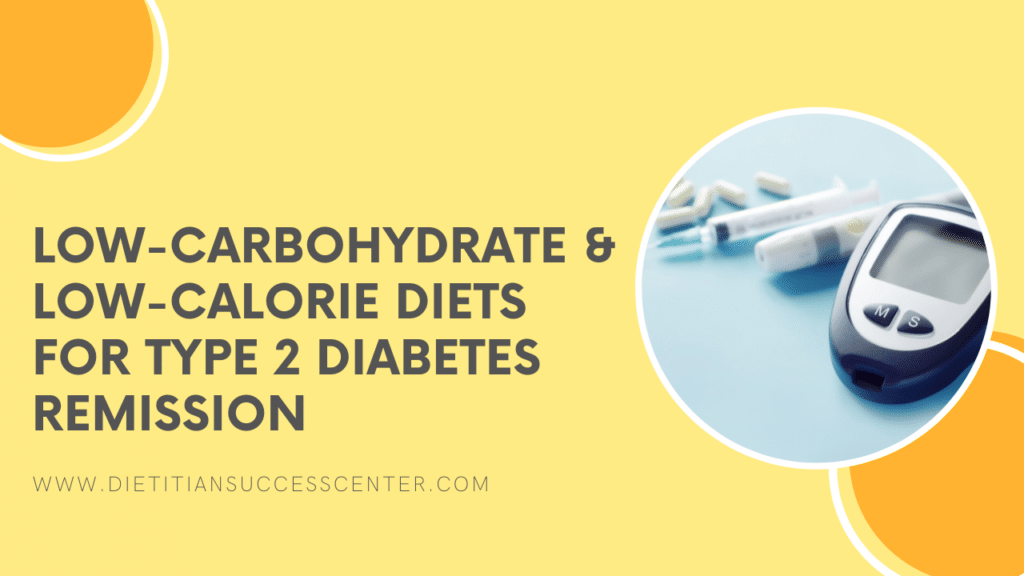

Written by Olivia Farrow, RD, MHSc
Reviewed by Erin M'Larkey, RD, MPH, CDE
In this article, we present evidence on the controversial topic of low-calorie and low-carb diets for the remission of type 2 diabetes mellitus (T2DM).
What’s in the News?
Recently, we’ve seen growing media coverage related to controversial diets (like low-calorie and low-carbohydrate diets) to achieve type 2 diabetes remission.
T2DM remission has also been a topic of discussion among national diabetes associations across the world:
-
- In 2022, Diabetes Canada published a guideline update “Remission of Type 2 Diabetes” and “Remission of Type 2 Diabetes: User’s Guide” which includes the recommendation of low-calorie diets to induce remission.
-
- Diabetes Australia and Diabetes UK published position statements on T2DM remission in 2021.
-
- A 2021 consensus statement from an international group with the American Diabetes Association discussed the definition of remission.
What Does Remission Mean?
The term “remission” is considered preferable to terms such as “cure” or “reversal” (1). Remission implies that the condition may not have signs, symptoms, or progression but could potentially return and thus requires ongoing monitoring (1).
The definition of “remission” of T2DM is a return to a hemoglobin A1C (HbA1C) level (average blood glucose level over approximately 3 months) less than 6.5% for at least 3 months without antihyperglycemic pharmacotherapy (1).
Diabetes Canada has a slightly different definition of T2DM remission (2):
-
- For remission to prediabetes: an HbA1C between 6.0% and 6.4%
-
- Remission to normal glucose concentrations: an HbA1C <6.0%
How is Remission Achieved?
Typically, intensive lifestyle interventions and/or significant weight loss of 10-15% of body weight are required for remission (1,2,3). Energy restriction and significant weight loss are thought to reduce liver fat accumulation, improve the functioning of beta cells and improve insulin sensitivity (4).
The main approaches that are considered for T2DM remission include:
-
- Bariatric surgery (5)
-
- Energy-restricted diet (with liquid diet component) (6)
-
- Very low carbohydrate diet (ketogenic diet for non-epilepsy use) (7)
-
- Exercise training (240-420 min/week) with caloric restriction (8)
-
- Mediterranean diet (9)
Evidence on Low-Carb/Low-Calorie Diets for Remission of T2DM
Let’s look more closely at low and very low carbohydrate and calorie diets for the remission of T2DM.
2022 Umbrella Review: looking at meta-analyses on weight loss and systematic reviews on diets for the remission of T2DM (9)
Findings:
-
- The highest weight loss is achieved with very low-calorie diets (400-500 kcal/day) and energy-restricted meal replacement diets (replacing all or some food with meal replacement drinks and/or bars).
-
- Low-carbohydrate diets were not more effective than higher-carbohydrate diets.
-
- An energy-restricted total meal replacement diet (all food replaced with meal replacement products) saw 54% T2DM remission at 12 months, partial meal replacement at 11% remission, a Mediterranean diet at 15% remission, and some low-quality studies showed 20% remission with low carbohydrate, ketogenic, and very low energy diets (without meal replacement).
The DiRECT (2018) and DiADEM-I (2020) trials: The main studies on low-calorie meal replacement diets for T2DM remission, considered in the above umbrella review and current guidelines/position statements by Diabetes Canada, UK, and Australia.
Findings:
-
- The DiRECT (Diabetes Remission Clinical Trial) randomized controlled trial (RCT) specifically looked at weight loss and remission of T2DM (6).
-
- The intervention was an intensive weight management program with a low-calorie total meal replacement diet for 3-5 months with gradual food re-introduction. The control group received standard diabetes care which involved medication and lifestyle advice.
-
- The trial found that 46% of the participants in the intensive weight management group achieved diabetes remission, compared to 4% of the control group. The result of T2DM remission was sustained at 24 months.
-
- Other findings included improvements in blood pressure, cholesterol levels, and quality of life, compared to the control group.
-
- The DiRECT (Diabetes Remission Clinical Trial) randomized controlled trial (RCT) specifically looked at weight loss and remission of T2DM (6).
-
- The DiADEM-I (Diabetes Intervention Accentuating Diet and Enhancing Metabolism) trial was similar to the DiRECT trial but studied participants in the Middle East and North Africa regions (10).
-
- This RCT looked at lifestyle intervention on body weight and blood glucose levels in participants with early diabetes (≤3 years since diagnosis). The intervention group received a personalized lifestyle intervention that included dietary changes, physical activity, and behavioral support, while the control group received standard diabetes care.
-
- The study results showed that the intervention group participants had significantly greater weight loss and reductions in blood glucose levels compared to the control group. The result of T2DM remission was sustained at 24 months. Unlike the DiRECT study, participants were encouraged to increase their physical activity. This resulted in less sedentary time, but not vigorous exercise.
-
- The DiADEM-I (Diabetes Intervention Accentuating Diet and Enhancing Metabolism) trial was similar to the DiRECT trial but studied participants in the Middle East and North Africa regions (10).
Key Takeaways
-
- Weight management programs based on a low-calorie total meal replacement diet may result in significant weight loss and reduced blood glucose, resulting in T2DM remission.
-
- Very low-calorie diets may have similar results, but low-carbohydrate diets are less likely to achieve the same results.
-
- Long-term results beyond 24 months of these diet approaches have not been established.
Evidence Limitations
The major limitations to the current evidence include:
-
- The short-term duration of the studies. Most current studies on dietary interventions have a duration of fewer than 24 months (9). There is a lack of long-term data on the sustainability of the effects of low-calorie meal replacement diets on type 2 diabetes remission beyond this time frame.
-
- Studies on this topic have primarily been conducted in clinical trial settings, which may not fully reflect real-world conditions. Participants in clinical trials may receive more intensive support and monitoring, leading to better adherence to the diet and better outcomes than individuals following the same diet on their own.
-
- Meal replacement studies did not look at participants with long-term diabetes diagnoses. Overall, the majority of participants had been diagnosed with T2DM within 6-24 months prior to the study. With long-term diabetes, there is often increased insulin deficiency; it cannot be assumed that these dietary approaches would have the same impact on someone with longer-term diabetes as it would for a new diagnosis of T2DM, which is mostly driven by insulin resistance.
Risks
For any medical intervention study, it is important to balance benefits and risks. Risks may be underestimated in studies that show potential benefits (9).
Energy-restricted diets, including very low-calorie and low-calorie total meal replacement, have potential associated risks. Substantial short-term weight loss also comes with potential risks. These risks should be considered before a benefit is conferred from the current evidence.
Risks may include:
-
- Lowered blood pressure and orthostatic hypotension (loss of blood pressure upon standing which can result in falls) (11).
-
- Nutrient deficiencies (in non-meal replacement interventions) (9).
-
- Impact of major dietary changes on social, cultural and lifestyle factors that impact dietary choices and potentially quality of life (9).
-
- Loss of muscle mass, which can be detrimental to overall health and well-being.
-
- Restrictive diets may lead to feelings of deprivation and disordered eating habits, which can have negative psychological effects (14).
-
- Weight regain. Weight maintenance after initial significant weight loss can be challenging related to the potential biological drive for weight regain after loss (15).
Key Messages for Healthcare Providers & Nutrition Practitioners:
-
- Remission is possible for T2DM but may require a significant commitment to a strict dietary regime to which long-term sustainability, benefits, and risks have not been thoroughly investigated.
-
- When working with clients/patients considering a diet for the remission of T2DM, focus on their individual health needs and goals. Aim to stay-client centered, validate their concerns, and support them with decision-making.
-
- Presenting the potential drawbacks and challenges to clients/patients in an unbiased way may help them in their decision-making.
-
- Dietitians can help to support individuals looking to manage their diabetes in meeting their nutritional needs, managing blood glucose, moving their body in enjoyable ways, and eating enjoyable foods.
-
- Ultimately, for some clientele, the potential for significant weight loss and diabetes remission can feel desirable enough to want to follow a very strict dietary regime. Practitioners can support clients/patients to unpack some of these underlying feelings and messages around weight loss and body image through compassionate, client-centered care.
-
- Healthcare professionals who disagree with the current messaging in their country’s guidelines/position statements around strict dietary regimes for T2DM remission can advocate or join advocacy efforts for the modification of these messages.
References
- Riddle, Matthew C et al. “Consensus Report: Definition and Interpretation of Remission in Type 2 Diabetes.” The Journal of clinical endocrinology and metabolism vol. 107,1 (2022): 1-9. doi:10.1210/clinem/dgab585
- MacKay, D et al., “Special Article: Remission of Type 2 Diabetes”.Diabetes Canada Clinical Practice Guidelines Expert Committee. Diabetes Canada 2018 Clinical Practice Guidelines for the Prevention and Management of Diabetes in Canada. Can J Diabetes 46 (2022) 753e761.
- Diabetes Australia. “Type 2 Diabetes Remission” (2021). Available from https://www.diabetesaustralia.com.au/wp-content/uploads/2021_Diabetes-Australia-Position-Statement_Type-2-diabetes-remission_2.pdf
- Lim, E L et al. “Reversal of type 2 diabetes: normalisation of beta cell function in association with decreased pancreas and liver triacylglycerol.” Diabetologia vol. 54,10 (2011): 2506-14. doi:10.1007/s00125-011-2204-7
- Rubino, Francesco et al. “Metabolic Surgery in the Treatment Algorithm for Type 2 Diabetes: A Joint Statement by International Diabetes Organizations.” Diabetes care vol. 39,6 (2016): 861-77. doi:10.2337/dc16-0236
- Lean, Michael Ej et al. “Primary care-led weight management for remission of type 2 diabetes (DiRECT): an open-label, cluster-randomised trial.” Lancet (London, England) vol. 391,10120 (2018): 541-551. doi:10.1016/S0140-6736(17)33102-1
- Goldenberg, Joshua Z et al. “Efficacy and safety of low and very low carbohydrate diets for type 2 diabetes remission: systematic review and meta-analysis of published and unpublished randomized trial data.” BMJ (Clinical research ed.) vol. 372 m4743. 13 Jan. 2021, doi:10.1136/bmj.m4743
- Ried-Larsen, Mathias et al. “Type 2 diabetes remission 1 year after an intensive lifestyle intervention: A secondary analysis of a randomized clinical trial.” Diabetes, obesity & metabolism vol. 21,10 (2019): 2257-2266. doi:10.1111/dom.13802
- Churuangsuk, Chaitong et al. “Diets for weight management in adults with type 2 diabetes: an umbrella review of published meta-analyses and systematic review of trials of diets for diabetes remission.” Diabetologia vol. 65,1 (2022): 14-36. doi:10.1007/s00125-021-05577-2
- Taheri, Shahrad et al. “Effect of intensive lifestyle intervention on bodyweight and glycaemia in early type 2 diabetes (DIADEM-I): an open-label, parallel-group, randomised controlled trial.” The lancet. Diabetes & endocrinology vol. 8,6 (2020): 477-489. doi:10.1016/S2213-8587(20)30117-0
- Haywood, Cilla J et al. “Obesity in older adults: Effect of degree of weight loss on cardiovascular markers and medications.” Clinical obesity vol. 9,4 (2019): e12316. doi:10.1111/cob.12316
- Festi, D et al. “Gallbladder motility and gallstone formation in obese patients following very low calorie diets. Use it (fat) to lose it (well).” International journal of obesity and related metabolic disorders : journal of the International Association for the Study of Obesity vol. 22,6 (1998): 592-600. doi:10.1038/sj.ijo.0800634
- Johansson, K et al. “Risk of symptomatic gallstones and cholecystectomy after a very-low-calorie diet or low-calorie diet in a commercial weight loss program: 1-year matched cohort study.” International journal of obesity (2005) vol. 38,2 (2014): 279-84. doi:10.1038/ijo.2013.83
- Grattan BJ Jr, Connolly-Schoonen J. Addressing weight loss recidivism: a clinical focus on metabolic rate and the psychological aspects of obesity. ISRN Obes. 2012 Oct 15;2012:567530. doi: 10.5402/2012/567530. PMID: 24527265; PMCID: PMC3914266.
- Stubbs, R James, and Jake Turicchi. “From famine to therapeutic weight loss: Hunger, psychological responses, and energy balance-related behaviors.” Obesity reviews : an official journal of the International Association for the Study of Obesity vol. 22 Suppl 2 (2021): e13191. doi:10.1111/obr.13191








